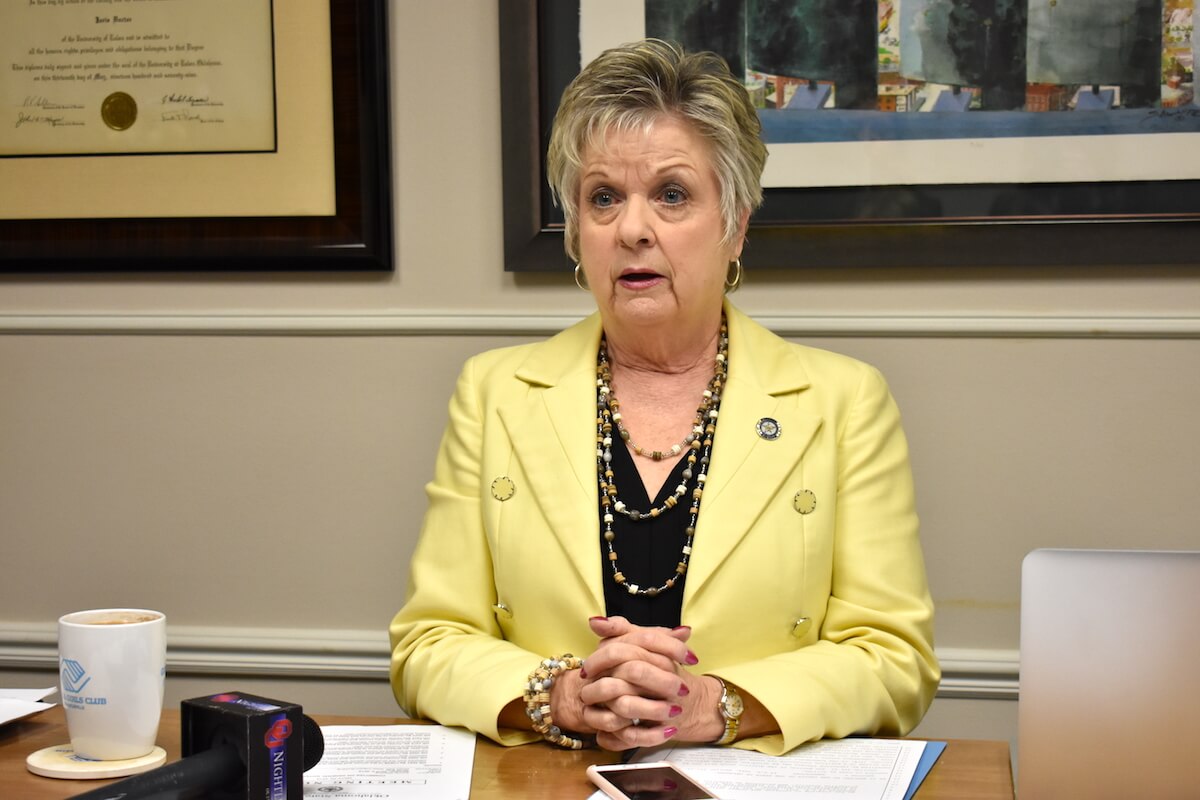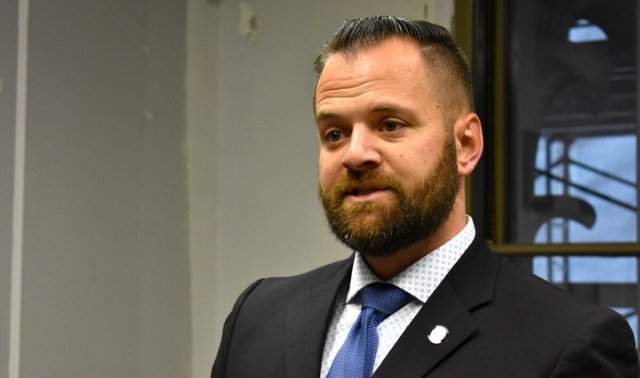
When Oklahoma lawmakers passed a historic revenue package to fund teacher pay raises and education appropriations last week, they did so with three votes to spare in the House and zero votes to spare in the Senate.
Despite broiling public pressure to address education funding, 10 of 48 Senate members voted against HB 1010XX last week. Some of those members turned around and voted for raising the minimum teacher pay scale.
Monday, during an education rally at the Capitol that drew thousands of educators from around the state, NonDoc attempted to interview all 10 senators who voted against the teacher-pay revenue bill. By the day’s end, nine of those senators had responded to some variation of three questions:
- What caused you to vote against HB 1010XX’s revenue package?
- What has been your experience with teachers who conducted the ongoing walkout?
- Do you believe the walkout is appropriate?
The following answers were excerpted from interviews that ranged between two and 10 minutes in length.
Oklahoma State Senate members who opposed HB 1010XX
Mark Allen (R-Spiro)
Asked about HB 1010XX’s passage and the ongoing teacher walkout, Allen requested that his comments not be recorded digitally.
“The cigarette tax is not sustainable,” Allen said. “The money should be in the classroom (…) and we have teachers up here during Spring Break. They also came out here close to testing time, and they should be making sure their students graduate this year.”
Randy Bass (D-Lawton)
Bass said he voted against HB 1010XX because he did not like the agreement between chambers to remove the hotel-motel tax.
“I didn’t like the part in there where it said they were going to eliminate the $5 tax — the motel-hotel tax — and then they were going to replace it with the Amazon tax,” Bass said. “Amazon tax has been out here 10 years, and it’s never passed, so I’m not sure they actually know how to make that happen. So my thought to these guys was to leave the hotel-motel tax in there (…) and when you figure out how to work the Amazon tax, then you can put the Amazon tax (in) and replace the hotel-motel tax.”
Bass called the teacher walkout “awesome.”
“I’m 100 percent for them. I don’t just think it can last one day,” he said. “I think it has to last until these guys can understand these guys are serious and you’re going to stay out until you get what you want, and that’s the only way you’re going to get what you want.”
Josh Brecheen (R-Durant)
Asked about his opposition to HB 1010XX, Brecheen said lawmakers should have focused on cutting “corporate welfare.”
HOUSE ‘NO’ VOTES
In their words: House members explain ‘No’ votes, discuss walkout by Garrett Davis & Tres Savage
“Where’s the $70 million taxpayers paid for wind subsidies in the discussion? Corporate welfare. The epitome of corporate welfare. We’re spending $70 million a year sending it to the wind industry, and we’re going to raise taxes on the average working family?” Brecheen asked. “Does the taxpayer not have the right to say, ‘Do I not have cause to be upset that you’re taking my monies, cutting a $70 million check?’ And that’s after you have zeroed out [wind companies’] entire income tax liability. You cut them a $70 million check, and you’re raising my taxes? Is there not a cause for the taxpayers to say, ‘Deal with corporate welfare first?'”
Brecheen said he focused on telling teachers Monday that the Legislature had options beyond raising taxes.
“I had respectful conversations with teachers today, and I went through all of the different options without raising taxes on working families,” he said. “And there are options. (…) I’ve had several bills pass the Senate that could leverage monies — as much as $150 million once implemented. When the average working family figures out there were options, teachers included in that, they had a tax increase laid on them while they got a pay raise increase. What about the $70 million corporate welfare payment to wind energy?”
Nathan Dahm (R-Broken Arrow)
Dahm, a Republican candidate for U.S. Congress, said he supported giving teachers a raise but did not believe raising taxes was required to do so.
“There’s plenty of areas for reforms that we should be addressing first and just putting more money (in) isn’t going to be a long term solution,” Dahm said. “I’m trying to think 20-30 years down the line. This is, at most a one-to-five-year solution. The Oklahoma model of government is very archaic — 1907 model in a lot of ways. Maybe 1950s, maybe 1980s but a lot of it is archaic. So we need to make a structural change to the way we operate instead of just adding more money to what we currently have.”
Dahm said teacher and constituent comments to him about the revenue bill and the school walkout “have been all over the board.”
“I have teachers that work on my campaigns that volunteer for me that are thankful for my vote, that don’t want to pay more in taxes either,” Dahm said. “Obviously, I have teachers that dislike my vote and want more money, even more than what they’re currently getting — $6,100. They want $10,00 to $12,000 or more. It’s kind of all over the board, different people. And the same with my constituents. Some say they want to pay more in taxes, most some say they don’t want to pay any more in taxes.”
Julie Daniels (R-Bartlesville)

Daniels said she believes she cast “a fiscally prudent vote” against HB 1010XX owing to its increase in the gross production tax incentive rate for oil and gas wells.
“Starting out, there was actually a three-two-one plan: $3,000, then $2,000 and then $1,000. I thought that was a prudent thing to do. That was a reasonable way to give a raise and see how the economy does, give more and see how the economy does and begin also to look at funding for other agencies,” Daniels said. “That one didn’t fly at all. I voted for the second one. I did not want to go as high as this last one, and taking gross production tax on all wells to 5 percent is very scary for our state. It’s a volatile revenue stream, when it’s good it’s exceedingly good; when it’s bad, it’s very bad. Now that we have committed to these teachers pay raises, they will not go away. You will either have to come back and tax Oklahomans more or you will have to make cuts elsewhere.”
Daniels said she did not view a teacher walkout as “appropriate” in light of the pay raises and funding increase passed last week.
“The tax package passed, the pay raise which all of us had been focused on was a part of that. So, no, I would have preferred all students to be in school today. I was very surprised, in fact, that they are not,” said Daniels, who emphasized that Oklahoma has many positive qualities beyond the difficulties many people discuss. “This is true everywhere in the country: You tend to talk down that which is closest to you. I think we do ourselves a great disservice by focusing on the negative and not the positive.”
J.J. Dossett (D-Owasso)
Dossett, one of three Democrats who voted against HB 1010XX’s revenue package, said he wished hearings on last week’s bills would have been delayed until details could have been fine-tuned this week.
“The way this building operates doesn’t make any sense at all. It was rushed through the House on Monday. It was rushed through the Senate on Wednesday. All kinds of glaring problems. Everyone saying ‘trust me, trust me. We’ll fix it. I promise,'” he said. “In this building, that’s just how it works. The walkout looming is what caused this. I really do give a lot of credit to educators for finally stepping up and saying we’re going to do this. They were trying to avoid it, and I think they almost got there.”
A former teacher himself, Dossett said he supports the ongoing walkout.
“I came to rallies. I asked for 10 years as a teacher and got nothing, nothing except tax cut after tax cut, education budget cut after education budget cut,” he said. “Teachers have finally wore out on asking, and that’s why I salute them for finally digging in and saying, ‘You know what? We’re going to have to do something more if we’re going to be considered serious.’ And that happened last week. They’re being considered seriously because this historic measure that doesn’t get anywhere near to what is the ask, that’s because of the pressure. The pressure on this week during the walkout ideally creates more positive results.”
Ikley-Freeman (D-Sand Springs)

Ikley-Freeman said she voted against the revenue bill for teacher pay raises because she listened to teachers who wanted additional classroom funding to help their students.
“The reason that I voted against 1010XX was because I was talking to teachers in the district and they were telling me that, ‘We understand that this is great, but it really doesn’t provide enough for operating costs,'” she said. “They are talking about leaky roofs and textbooks that are 15 years old. This really doesn’t help us with what we need.”
Asked her feelings on the teacher walkout, Ikley-Freeman referenced 20 percent of Oklahoma schools currently employing a four-day school week.
“The funding that was passed does nothing to help that,” she said. “I would like to see teachers stick to what brought them [to do] this. I would like to see them stay here until they get what they need for their classrooms.”
Anthony Sykes (R-Moore)
Throughout his career, Sen. Anthony Sykes has routinely expressed his desire not to speak to media. NonDoc was unable to contact him in his office Monday.
Joseph Silk (R-Broken Bow)
Silk said his main problem with HB 1011XX was that it lacked education reform components.
“There were zero long-term, fiscally responsible reforms in it and the entire bill was just a massive tax increase,” he said.
Silk said he understands teacher frustration and wished a walkout had not been needed.
“I wish they didn’t have to walkout. Is it going to be effective? I don’t know,” he said. “We’ll see what happens, but again there is no long term solutions and I hope they shift their talking points and messaging to, ‘We want real long-term solutions through reforms rather than just through taxes.’”
Silk said “almost all” of the teachers who attended Monday from his district were “very civil.”
“Most of them disagree with my vote, but when I explain to them the reasoning why, they understand that and would like to have those reforms as well,” he said. “Most of them view this as a starting point, which it is, but I would say it compounds the issue because we added money to the budget without any reform, so it really made a broken system more broken. This is a step backwards for education in Oklahoma because it’s not going to fix anything. All it’s going to do is give teachers a small pay raise. That’s about it.”
Rob Standridge (R-Norman)
On HB 1010XX, Standridge said: “I just didn’t care for the package. Hotel-motel (tax) was a part. And I think GPT at 5 (percent) was a touch high. And we didn’t really get any reforms.”
He said he had hoped a commitment to merit pay or a mandate for districts to have a five-day school week could have been included in any teacher pay agreement.
“I always respect people’s passion and positions,” Standridge said about the teacher walkout. “I’m not faulting them for walking out. I think for the overwhelming most part, they were respectful and courteous.”
(Editor’s note: Carson Williams contributed to this story.)























